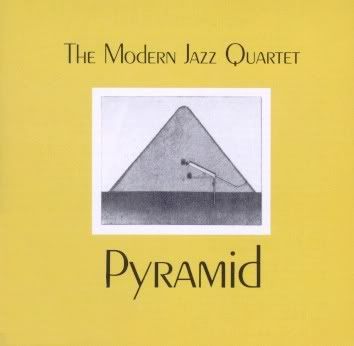
The Modern Jazz Quartet - Pyramid - 1959 - Atlantic
This is a strong recording from The Modern Jazz Quartet with inventive versions of John Lewis's "Vendome," and Ray Brown's "Pyramid," Jim Hall's "Romaine," Lewis's famous "Django," and cooking jams on "How High the Moon" and "It Don't Mean a Thing." The MJQ had become a jazz institution by this time, but they never lost their creative edge, and their performances (even on the remakes) are quite stimulating, enthusiastic and fresh. © Scott Yanow, All Music Guide
TRACKS
1. Vendome (2:30) Composed by John Lewis
2. Pyramid (Blues for Junior) (10:46) Composed by Ray Brown
3. It Don't Mean a Thing (If It Ain't Got That Swing) (5:02) Composed by Irving Mills
4. Django (5:23) Composed by John Lewis
5. How High the Moon (6:15) Composed by Nancy Hamilton
6. Romaine (7:28) Composed by Jim Hall
MUSICIANS
Percy Heath - bass
Milt Jackson - vibes
Connie Kay - drums
John Lewis - piano
BIO (Wikipedia)
The Modern Jazz Quartet was established in 1952 by Milt Jackson (vibraphone), John Lewis (piano, musical director), Percy Heath (bass), and Kenny Clarke (drums). Connie Kay replaced Clarke in 1955. Through the years the quartet had performed in several jazz styles, including bebop, cool jazz and third stream. Milt Jackson, Lewis, and Clarke had originally played together in a quartet while in the Dizzy Gillespie orchestra from 1946 to 1950. Together with Ray Brown they played during interludes designed to give the trumpeters time to recover from the challenging upper register trumpet parts. This line-up recorded as the Milt Jackson Quartet in 1951.
Jackson and Lewis originally shared the role of musical director but Lewis eventually took over the entire responsibility of this position.
In their middle years the group often played with classical musicians, but its repertoire consisted mainly of bop and Swing era standards. Among the original compositions from the band's book are "Django" by Lewis (a tribute to the Belgian jazz guitar player Django Reinhardt), "Afternoon In Paris", also by Lewis and "Bags' Groove" by Jackson (Bags was his nickname).
The group was first signed by Prestige and later in the 'fifties with Atlantic. In the late 1960s, in between their two periods with Atlantic, they signed with Apple, the Beatles label (the sole jazz group on the label), and released two albums – Under the Jasmine Tree (1967) and Space (1969).
Jackson left the group in 1974 partly because he liked a freer blowing style of playing and partly because he was tired of playing for little money (compared to rock and roll stars). As there could be no Modern Jazz Quartet without the two principals Lewis and Jackson, the group disbanded. In 1981 the MJQ reorganized to play festivals and later on a permanent six months per year basis. The MJQ's last recording was issued in 1993. Heath, the last surviving member, died in 2005. The enigma of the MJQ's music-making was that each individual member could improvise with an exciting vibrancy but in toto the group specialised in genteel baroque counterpoint. Their approach to jazz attracted promoters who sponsored 'jazz packet' concerts during the 1950s. One show would consist of several contrasting groups. The MJQ were ideal participants because no other group sounded like them. They provided a visual contrast as well, attired in black jackets and pin-striped trousers.
The group played blues as much as they did fugues, but the result was tantalising when one considered the hard-swinging potential of each individual player. Their best-selling record, Django, typified their neo-classical approach to polyphony.





1 comment:
LINK
Post a Comment